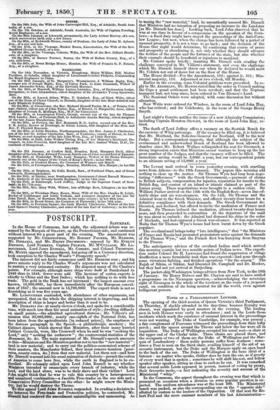The Levant mail arrived in town yesterday evening, with startling
news from Athens—to the 19th January. The papers this morning add nothing to clear up the matter. Sir Thomas Wyse had long been nego- tiating "differences" with the Greek Government,—payment of claims to British subjects, compensation for injuries, reparation for insults to the British flag, and cession of an island or islands claimed as part of the konian group. These negotiations were brought to a sudden crisis. Sir iWilliam Parker arrived on the 12th with the English fleet—seven line-of- battle ships and six war-steamers. On the 15th, Sir Thomas and the Admiral went to the Greek Minister, and offered twenty-four hours for a definitive compliance with their demands. The Greek Government de- liberated, and declined, but offered to invite the mediation of France and Russia. Sir Thomas 'refused the mediation, allowed twenty-four hours more, and then proceeded to extremities. At the departure of the mail he was about to embark : the Admiral had disposed his ships in the order of blockade, and had captured a Greek war-steamer. It was reported at Malta that Sir Thomas Wyse's house had been burnt down, by the Greek populace. The overland mail brings today "late intelligence " that "the Ministers of France and Russia had presented protestatory notes against the demands of Sir Thomas Wyse," and the French fleet was hurrying from Smyrna to the Pirteus.
The anticipatory advices of the overland Indian mail which arrived this morning contain but two notable points of Indian news. The expedi- tion under Colonel Sir H. Lawrence had found the suppression of village disaffection a more formidable task than was expected—had gone through some victorious fighting, and finished operations "for the season." The Rajah of Sikim, or Sikkur, had liberated Dr. Campbell and Dr. Hooker, but they had not yet arrived at Darjeeling. The packet-ship Washington brings advices from New York, to the 10th of January. Sir Henry Bulwer and Mr. Clayton are said to have settled a programme on the Nicaragua question,—acknowledging the sovereign right of Nicaragua to the whole of the territory on the route of a proposed canal, on condition of its being neutral for all the world, even against belligerent powers.


























 Previous page
Previous page